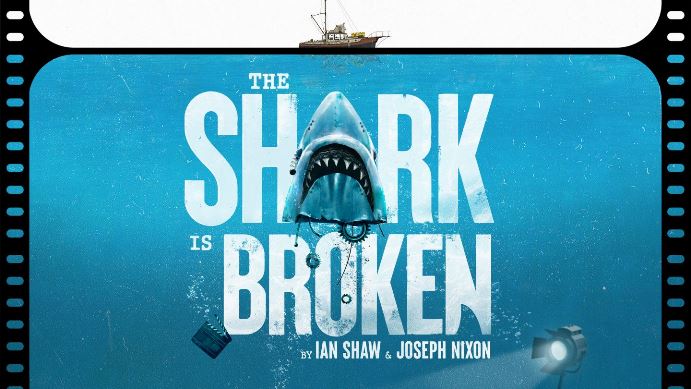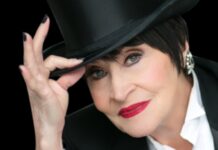When the summer blockbuster Jaws, based on the 1974 novel by Peter Benchley, directed by Steven Spielberg, and starring Roy Scheider, Richard Dreyfuss, and Robert Shaw, was released in 1975, it ranked for two years as the highest-grossing movie of all time. But despite its success at the box office, its filming, shot mostly on the ocean at Martha’s Vineyard, was plagued with problems, including bad weather, choppy waters, a malfunctioning mechanical shark, and a budget and shooting schedule that far exceeded the original estimates of $3.5 million and 55 days, ultimately coming in at $9 million and 159 days. Along with all that were two lead actors who didn’t get along, trapped in close quarters on the Orca, the small boat at the center of the shark-hunting thriller.
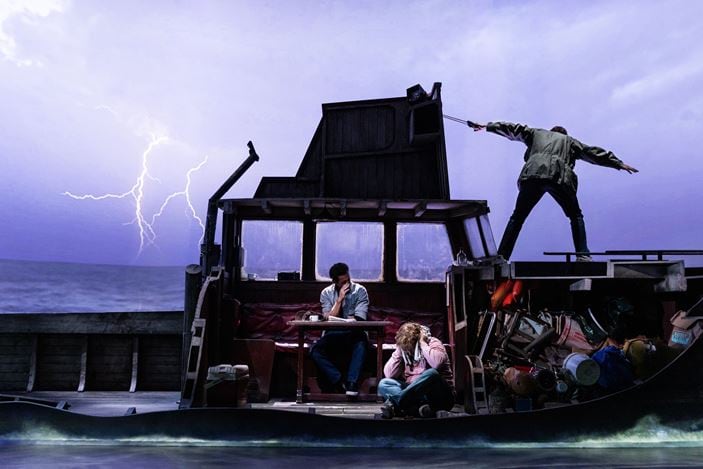
Following its acclaimed runs at Edinburgh Festival Fringe in 2019, and London’s West End in 2021, The Shark is Broken, based on the real backstage drama that ensued during the turbulent 1974 filming of the cinematic hit, is now making its Broadway debut in a limited engagement at the John Golden Theatre. Conceived by Robert’s son Ian Shaw and co-written with Joseph Nixon after reading his late father’s “drinking diary” in 2017, the show brings to life the journal’s personal first-hand accounts of the chaotic behind-the-scenes experiences and interactions of the three stars on the infamous shoot. It’s an uproarious view of rampant dysfunction through the lens of laugh-out-loud comedy, tempered with some sobering scenes of psychological insight and poignancy that add three-dimensional depth to the characters and provide an explanation for their over-the-top antics.
Under the direction of Olivier Award winner Guy Masterson, the stellar trio of Alex Brightman as Dreyfuss, Colin Donnell as Scheider, and Ian Shaw as Robert Shaw, to whom he bears a striking resemblance, work together flawlessly to bring the laughs and the lingering impact of a toxic childhood. All masterfully capture the distinctive personalities and behavior, familiar speech patterns and mannerisms of the well-known actors, as they risibly argue, exchange insults, egotistically compete, and candidly share their views on the significance of the movie they’re making, their thoughts on the importance of their chosen profession, and the backstories of their troubled relationships with their fathers, amidst the film’s ongoing delays and their own persistent drinking. There are also a few zingers about Nixon and future films by Spielberg thrown in, which tie the era to our current times and draw audible reactions from the audience.
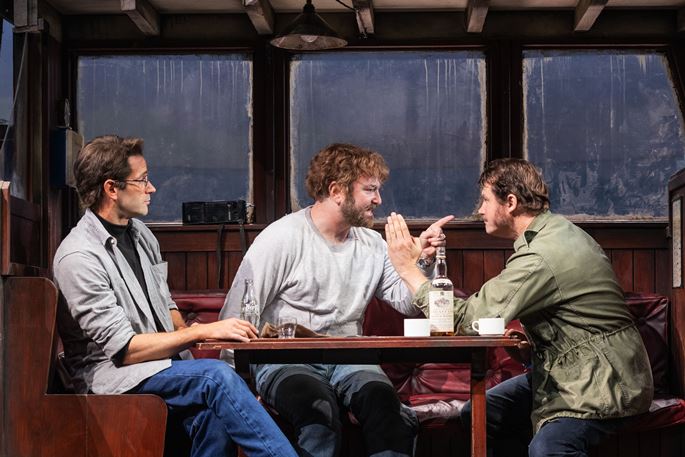
Donnell’s Scheider, with a signature cigarette often seen hanging from his mouth, is cool, calm, and collected in his peacemaking efforts to ease the growing tensions between his battling castmates, until his sunbathing in a Speedo is unexpectedly interrupted and unleashes an uncharacteristic fit of rage, from which he quickly recovers his suave composure. The always outstanding Brightman brings down the house with his sidesplitting performance as the foul-mouthed, neurotic, coke-snorting Dreyfuss, who brazenly challenges the competitive and condescending Shaw, suffers from bouts of seasickness, paranoia, and impostor syndrome, and experiences an extended emotional breakdown triggered by the substances he ingests, expertly delivering the physical comedy, riotously funny lines, and unbridled emotions with consummate timing and no-holds-barred relish. And Shaw is a revelation as his heavy-drinking gravelly-voiced British father, a veteran of classic theater who quotes Shakespeare, incessantly belittles his co-star with a barrage of insults, physically attacks him, passes out from his excessive alcohol consumption, and struggles with his lines, then closes with his character’s powerful USS Indianapolis speech from the film, recounting the sinking of the WWII ship in shark-infested waters – a monologue that was rewritten for himself by Robert Shaw – which pays homage to him and underscores the unquestionable talents of both father and son.
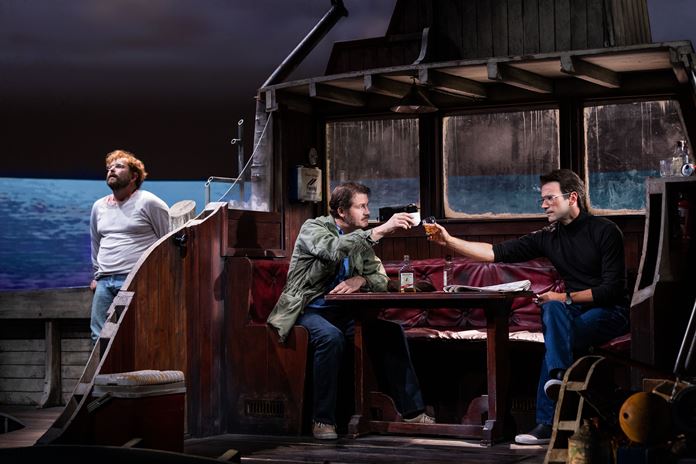
The terrific cast is supported by voiceovers representing the unseen Spielberg and his production team, spot-on dialect coaching by Kate Wilson, and well-executed movement direction by Patrick McCollum. Duncan Henderson’s set recreates a cross-section of the boat, with video projections by Nina Dunn (for PixelLux) that capture the waves at the bottom of the vessel and the changing conditions of the sky and ocean on a curved screen behind, along with the smoking, sinking fin of the failing mechanical shark, enhanced by Jon Clark’s lighting and Adam Cork’s sound. Cork’s original music references the ominous notes of John Williams’ famous score, and Henderson’s costumes, and wigs by Campbell Young Associates, authentically define the individual styles of the actors and their recognizable looks.
Whether or not you’re a longtime fan of Jaws, The Shark Is Broken will take you on a wildly entertaining and revealing ride through the tumultuous making of the movie and an inside view of the stars that made it a classic.
Running Time: Approximately 90 minutes, without intermission.
The Shark Is Broken plays through November 19, 2023, at the John Golden Theatre, 252 West 45th Street, NYC. For tickets (priced a $74-248, including fees), go online. Masks are not required.


